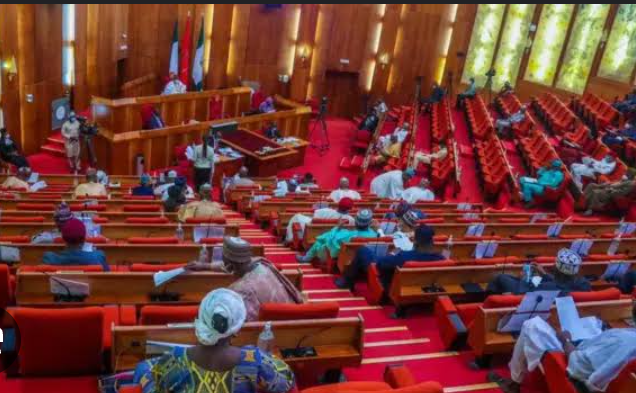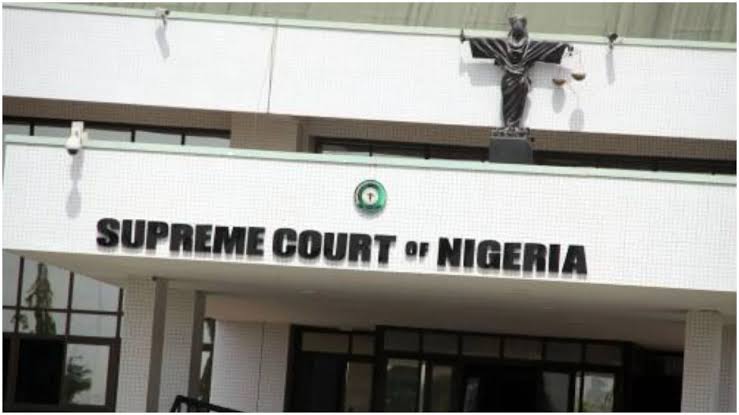News
JUST-IN: Senate Slams Kano Senator, Denies N21m Monthly Pay For Senators

By Kayode Sanni-Arewa
The Senate on Thursday denied the revelation made by the senator representing Kano South district, Abdurrahman Kawu Sumaila that each senator earns a total of N21 million monthly in salary and allowances.
Recall that Sumaila, a senator elected on the platform of the New Nigeria Peoples Party (NNPP) had during a BBC Hausa Service interview said that he earns a total of N21 million monthly in salary and allowances.
In the interview, Senator Sumaila clarified that his actual monthly salary is under N1 million, dropping to just over N600,000 after deductions.
He also mentioned that due to a recent increase, each senator receives N21 million monthly as a running cost.
However, Senator Yemi Adaramodu, representing Ekiti South and Chairman, Senate Committee on Public Affairs, emphasised that running costs are different from the salaries and personal allowances set by the Revenue Mobilisation, Allocation and Fiscal Commission (RMAFC) for the lawmakers.
According to the RMAFC Chairman, Muhammed Bello, each senator’s monthly salary and allowances total N1,063,860.
Senator Adaramodu explained that running costs are not exclusive to the legislature as they are necessary for the operational expenses of all governmental bodies.
He stressed that these funds are accounted for and used solely for official purposes, requiring proof of genuine expenditure.
He stated, “This is not a personal allowance or salary for the legislator. These funds also support the staff of constituency offices.”
The Senate spokesperson expressed discontent with the portrayal of excessive spending in Parliament, asserting that the Nigerian Senate is composed of highly accomplished professionals motivated by a commitment to improving Nigeria’s political and socio-economic landscape.
The statement reiterated, “For the umpteenth time, the Senate must respond to the outdated claims regarding inflated salaries and allowances attributed to senators. The RMAFC has clearly outlined the monthly take-home pay for senators.”
He further noted that all government branches, including governors, ministers, and local councils, utilise running costs for their operations, maintaining that the National Assembly is no exception.
He noted that the funds mentioned by Senator Sumaila are designated for the daily operations of senators’ offices, oversight activities, and community engagements, all of which he said are budgeted annually and properly accounted for.
He added that the National Assembly accounts for about 1% of the federal budget and has consistently adhered to this limit, even amidst financial constraints.
Adamodu expressed the commitment of the Senate to “serving the nation with integrity and dedication, driven by patriotic desire to revitalise Nigeria’s socio-economic fabric.”
News
Supreme Court dismisses suit seeking to compel Federal Government’s disclosure of gas earnings

The Supreme Court has thrown out suit by the 36 state governments seeking to compel the Federal Government to account for its earnings from the sale of liquefied natural gas, natural gas liquids and related products since 1999.
In a unanimous judgment, a seven-member panel of the court, presided over by Justice Uwani Abba-Aji ruled that the court does not have the original jurisdiction to hear and determine the suit, which has the Attorney General of the Federation, AGF, as the sole defendant.
Justice Mohammed Lawal Garba, in the lead judgment, affirmed the preliminary objection raised against the suit by the AGF and held that the subject of the case had been dealt with by the Supreme Court in its earlier decision in the case of the Attorney General of Bauchi State against the AGF.
Justice Garba agreed with the defendant that the suit amounted to an attempt to re-litigate issues already decided by the Supreme Court in the AG, Bauchi v. AGF case, which relates to the revenues accruable to the government of the federation, which are payable into the federation account.
He held that the Supreme Court lacked the original jurisdiction to preside over and determine the case.
The judge proceeded to strike out the suit for want of jurisdiction to hear the case as presently constituted.
Other members of the panel, Justices Abba-Aji, Emmanuel Agim, Simon Tsammani, Stephen Adah and Jamilu Tukur, agreed with the lead judgment.
News
N5m donation tears Celestial church apart, founder’s son disrupts service

The Celestial Church of Christ, Acts of Apostle Parish, Ketu, Alapere, Lagos, has been thrown into crisis following the donation of N5m by the church authority.
Saturday PUNCH gathered that the crisis erupted during a Sunday service last week when an acclaimed son of the church founder, Muyiwa Oluponna, stormed the church and disrupted service in an attempt to install himself as the shepherd of the church.
Oluponna allegedly seized the microphone from the acting shepherd of the church, Adetayo Adetola, during the sermon and claimed to have the right to deliver sermons every second Sunday of the month.
A viral video that circulated on social media captured the disruption and showed Oluponna and some members of the church engaging in a heated argument.
Our correspondent gathered that the development forced the church authority, through a task force, led by Akinbode Adjovi, to shut down the church for 40 days.
Narrating the incident to Saturday PUNCH, Adetola alleged that Oluponna demanded that the N5m donated by the church authority to the parish for renovation and construction of a clergy house be given to the family.
“That Sunday, our shepherd was not around and I was put in charge of the church. I was also assigned to give the sermon. We started the service and everything was going well until he (Oluponna) snatched the microphone from me, demanding to speak.
“I respected him and gave him the microphone because I knew him as a family member of the church founder. Immediately he collected the microphone, he said the N5m given to the church by the headquarters for renovation does not belong to the church but to the family of Oluponna who founded the church.
“He also demanded that money be given to the family, insisting that the church belongs to the family and not the community or the CCC authorities.
“He also demanded that he be made the church shepherd and be allowed to give sermons every second Sunday of the month. We all kept quiet until he finished.
“After that, I took over to deliver the sermon, but to everybody’s surprise, he came back and snatched another microphone from one of the choristers and came to the pulpit to give the sermon. That was when we all resisted him”, Adetola said.
Also speaking, the Shepherd of the church, Emmanuel Iperepolu, alleged that Oluponna had been causing trouble in the church, threatening him and other church members whom he perceived were against him.
Iperepolu said the incident had been reported to the church authorities and the police.
“I think the donation prompted him to do what he did, but before the issue of the money came, he had been coming to the church to threaten and abuse me and others. However, immediately after he heard about the donation, he came and demanded that the money be handed over to the family.
“He said the church belongs to the family of Oluponna, hence the money belongs to the family and not the church. The church authority has taken over the issue, and they have invited me and representatives of the family for questioning,” Iperepolu said.
Meanwhile, the Head of Media and Publicity of CCC, Kayode Ajala, said the church was shut down to prevent further breakdown of law and order.
“The church is a house of God but when things are going wrong and people’s lives are being threatened we have to do something.
“The church authorities cannot fold their arms and allow people to get killed; we have to intervene and this is why we shut down the church temporarily, while investigation is going on.
“All those involved in the conflict are being talked to and resolution is going on and once all that is done, the church will be reopened,” Ajala said.
When Saturday PUNCH asked about whether the church crisis was caused by the N5m donation, Oluponna declined to comment, saying the issue was between the family and the church.
Credit: PUNCH
News
Empowerment projects now conduit for embezzlement – ICPC

The Independent Corrupt Practices and Other Related Offences Commission has raised concerns over what it described as politicisation of empowerment projects in Nigeria.
ICPC also revealed that empowerment programmes had become significant conduits for embezzlement and mismanagement of public funds.
This was revealed in the Phase VI report of the constituency and executive projects tracking exercise, which was released by the commission on Thursday.
A total of 1721 government-funded projects with a total value of N284, 602,881,868.57 were tracked during the exercise which spanned from November 2023 to May 2024.
In the report, the ICPC identified numerous instances where empowerment items, which are intended for poverty alleviation and to support the most vulnerable, were procured but hoarded by project facilitators for potential use in political campaigns.
The report added that of the total tracked projects, 26.1 per cent—or 449 projects—were categorised as empowerment initiatives, amounting to over N35.5 billion in contract awards.
The report partly read, “Empowerment items are meant to be distributed to intended beneficiaries to empower them or to serve as poverty alleviation items. These items were procured but hoarded by the project facilitators possibly for electoral campaign activities.
“Large-scale soft/fluid projects and empowerment projects as major conduits for siphoning public resources: Empowerment/soft projects deserve special attention in this report in view of their increasing propensity within the budget as more project sponsors now prefer to embed such projects for execution in the budget.
“In the course of Phase VI project tracking, it was discovered that the aggregate number of empowerment projects tracked amounts to 449 empowerment projects (26.1% of the total tracked projects), while the aggregate sum/value of contract award on empowerment projects is N35,585,340,728.91.
“In all the shenanigans found in the course of tracking empowerment projects, contractors, project facilitators as well as the executing agencies staff cannot be excused of gross connivance.
The ICPC further revealed that in agencies such as the North East Development Commission and the Hydro-Electric Power Producing Areas Development Commission, empowerment items were handed over to stakeholders instead of directly reaching the intended recipients.
-

 News15 hours ago
News15 hours agoReps Demand Details Of Project Undertaken From Ministry Of Solid Minerals In 2024 Budget
-

 News24 hours ago
News24 hours agoSAD! 38 Casualties As Gunmen Ambush Shiite Convoys
-

 News20 hours ago
News20 hours agoSimon Ekpa to Face Extradition, DHQ Declares
-

 News24 hours ago
News24 hours agoIPOB Rejects Simon Ekpa Amid Finland Detention, Says He Was Never A Member
-

 News20 hours ago
News20 hours agoFilling stations set to adjust pump price as petrol crashes by over N300
-

 Education19 hours ago
Education19 hours agoBREAKING! END of road for Fubara as FG halts allocation
-

 News20 hours ago
News20 hours agoOil theft: DHQ rubbishes Tompolo’s allegation against Navy
-

 News24 hours ago
News24 hours agoTrump Announces Pam Bondi For Attorney General after Rep Gaetz Withdrawal








